What makes brands and businesses stand out in today's fast-paced economic scenario? - Maintaining a strong, foolproof Customer Relationship Management System. To achieve this specific objective, brands often attempt to leverage various systems that promise to streamline operations and enhance customer interactions. However, not all software systems are created equal!
In this comprehensive study, we'll delve deep into the multiverse of Customer Relationship Management (CRM) systems and explore their advantages over the alternatives. And there indeed are a few alternatives such as Enterprise Resource Planning (ERP), Supplier Relationship Management (SRM), Content Management Systems (CMS), and Supply Chain Management (SCM). Each methodology has its pros and cons. By the end, you will have a crystal-clear understanding of why CRM systems emerge as the ultimate solution for nurturing customer relationships.
Before we go into the intricate details, let’s have a top-view look at the systems we'll be discussing -
Customer Relationship Management (CRM) -
A robust framework that lets brands and companies efficiently manage, organize, analyze, and nurture their customer relationships. It acts as a focal point for planning and streamlining customer-related operations, helping firms forge strong, long-lasting bonds with their clientele. CRM enables firms to manage sales leads, track vital client information, and automate several marketing tasks.
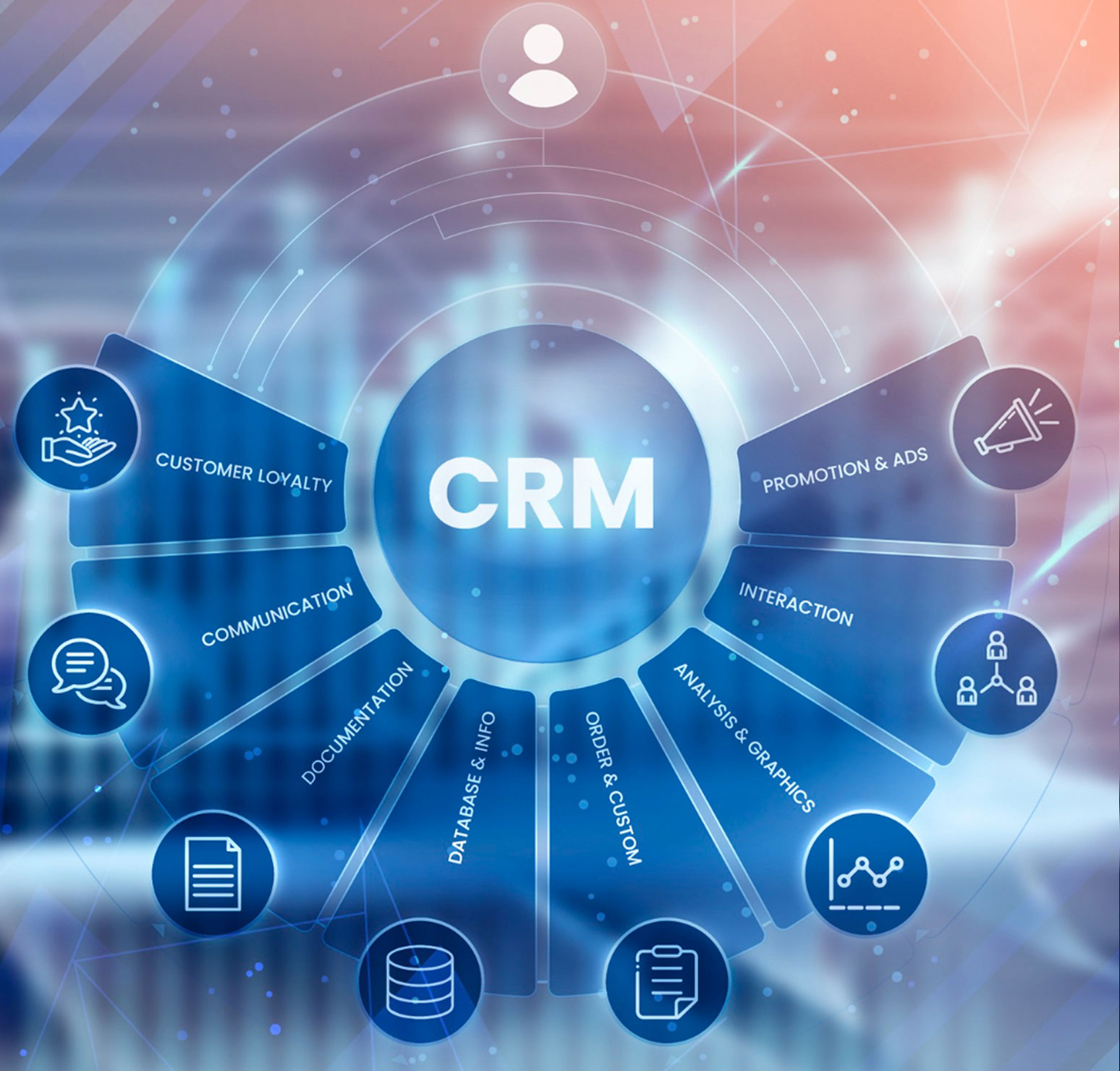
Enterprise Resource Planning (ERP) -
A system that aims to provide a comprehensive solution for integrating operations and streamlining a brand's essential operational procedures. By unifying various functions such as finance, production, and human resources, ERP systems enhance overall efficiency and productivity within an organization. With ERP, businesses can achieve better control over their resources, optimize processes, and realize cost savings through improved resource allocation and streamlined workflows.
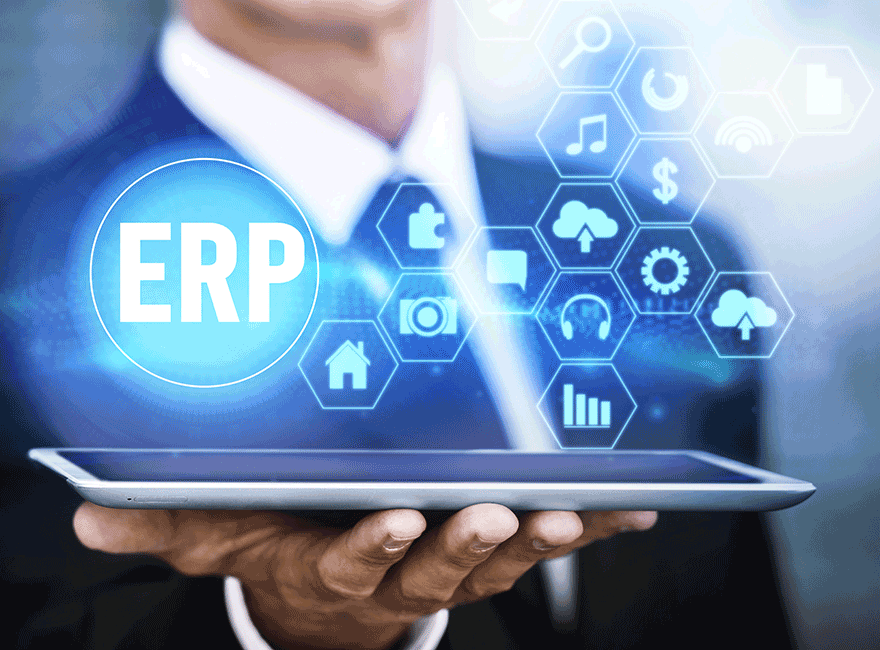
Sales Relationship Management (SRM) -
A system that plays a crucial role in managing and nurturing interactions with suppliers. SRM Systems provides businesses with tools and functionalities to effectively handle contracts, track supplier data, and negotiate favorable rates. They help businesses cultivate mutually beneficial relationships with their suppliers, ensuring transparency, effective communication, and prompt issue resolution. By leveraging SRM, businesses can optimize their supplier interactions, enhance collaboration, and drive smooth operational excellence across the supply chain.
Content Management System (CMS) -
A system designed to empower companies and businesses in managing and creating their website along with arranging content in an optimized way. CMS platforms offer a range of benefits, including the ability to handle images and videos, create and update web pages, and monitor website traffic. They provide businesses with a user-friendly interface and intuitive tools to create, organize, and publish content efficiently. CMS systems are invaluable in maintaining a dynamic online presence, enabling businesses to engage customers through compelling and relevant content.
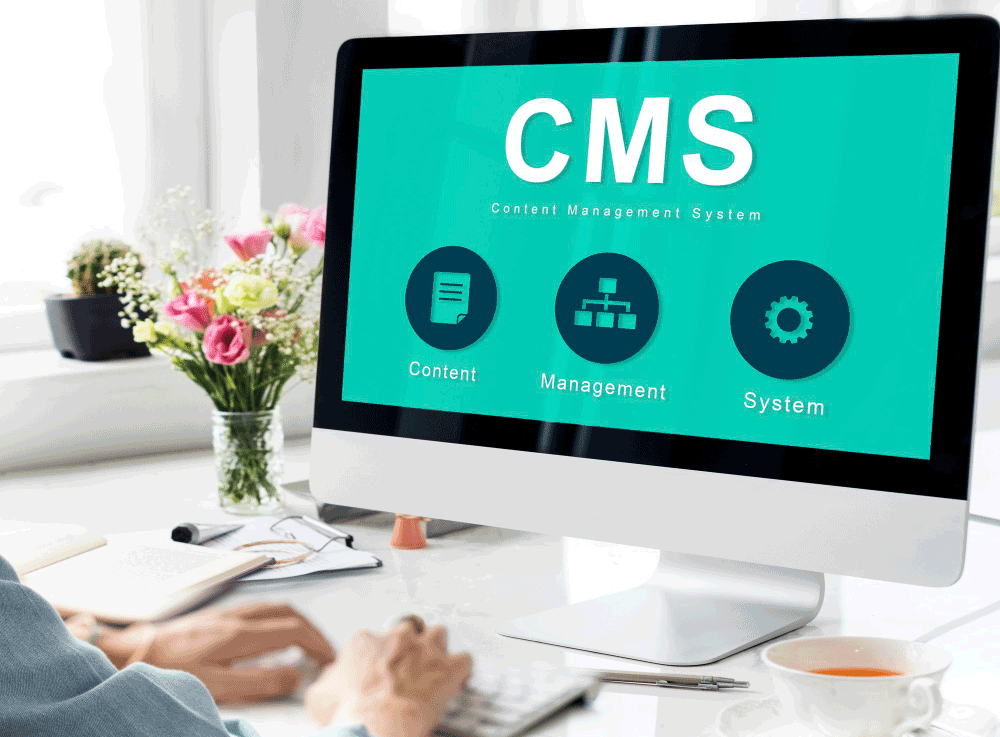
Supply Chain Management (SCM) -
A system that makes the flow of products and services between suppliers and customers as efficient as possible. SCM systems include a wide range of tasks, including manufacturing, distribution, logistics, and purchasing. They provide companies the ability to have more insight and control over their supply chain, which improves productivity, lowers costs, and boosts customer satisfaction. SCM systems foster operational excellence and promote seamless supply chain operations by simplifying procedures, optimizing inventory levels, and fostering stakeholder communication.
So, which system is right for you? Well, it truly depends on your actual needs. And to get a thorough understanding of your business needs, stay tuned. As we dive deeper, we'll analyze every alternative CRM has!
CRM vs. ERP
How does CRM differ from ERP - What issues do they address?
CRM and ERP are two of the most popular enterprise software applications available currently. Both systems can help businesses improve their efficiency and profitability, but they serve different purposes.
Enterprise Resource Planning aka ERP systems are designed to primarily focus on integrating various business functions, such as financial operations, human resources, and supply chain, to enhance operational efficiency. While ERP is critical for internal processes, CRM or Customer Relationship Management Systems take a customer-centric approach, prioritizing interactions, sales, and marketing activities. CRM systems provide a 360-degree view of customers, enabling businesses to deliver personalized experiences, address concerns, and build lasting relationships.
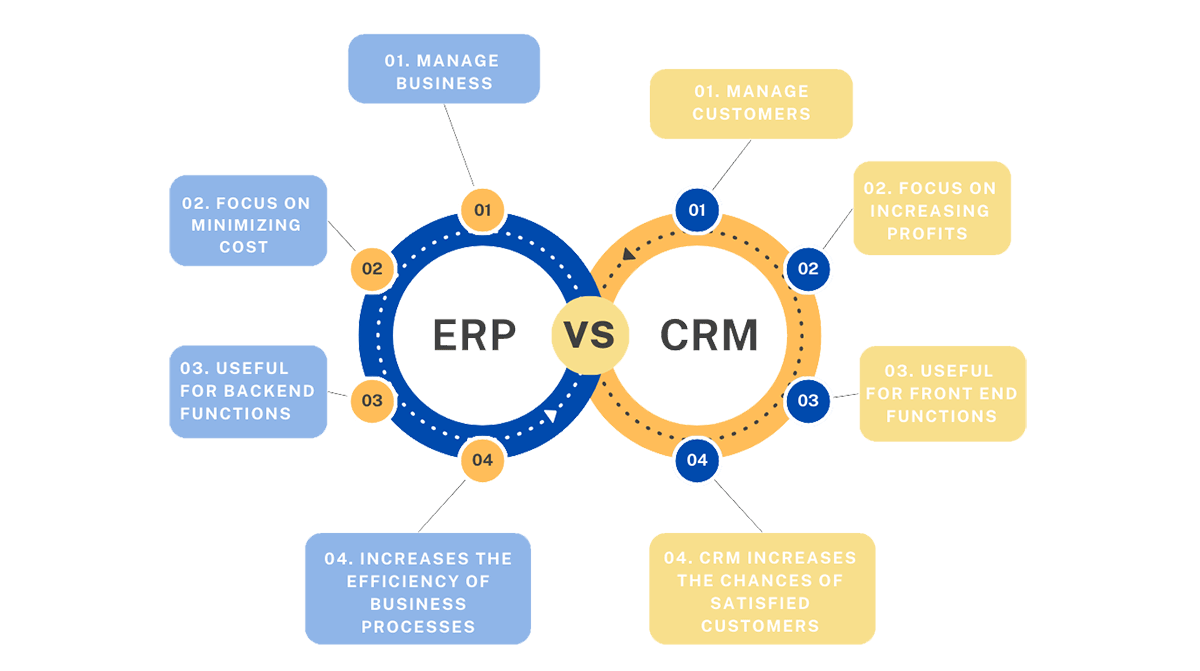
Example Case Study
Suppose a leading e-commerce retailer, implemented both ERP and CRM systems. While the ERP system will help the business manage inventory and streamline order processing, CRM will prove instrumental in enhancing customer satisfaction. By leveraging CRM, the brand can gain valuable insights into customer preferences, enabling them to personalize product recommendations and drive repeat sales.
To understand individual point-wise comparisons, check out a study on CRM by Forbes.
CRM vs. SRM
How does CRM outperform SRM in terms of relationship cultivation?
Being customer-facing systems, CRM and SRM are meant to serve different purposes. CRM systems are designed to help businesses manage their interactions with customers, while SRM systems are designed to help businesses manage their relationships with suppliers.
In other words, Supplier Relationship Management aka SRM systems will optimize supplier interactions and improve procurement processes. However, CRM goes beyond supplier management and extends its capabilities to build strong relationships with suppliers as well. By leveraging Customer Relationship Management/CRM systems, businesses can streamline communication, negotiate contracts, track performance, and ensure prompt issue resolution. This holistic approach enables companies to forge mutually beneficial partnerships and optimize their supply chain operations.
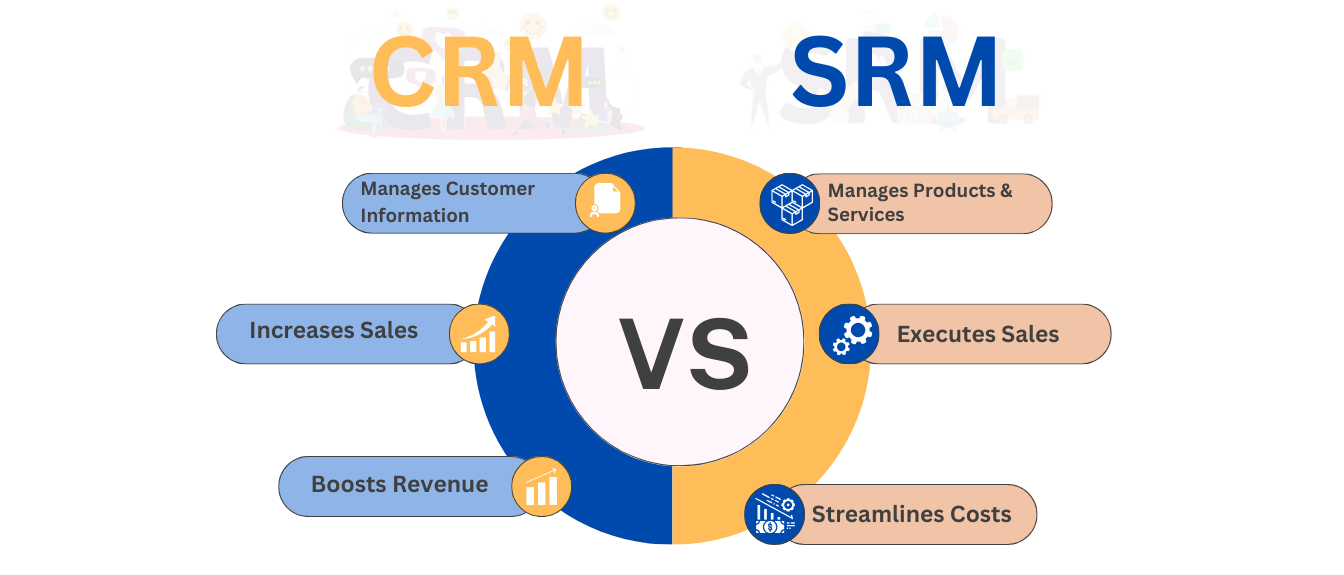
Check out this article for a further detailed understanding of this topic.
Example Case Study
Consider a scenario where a global leader in automotive components, transitioned from an SRM system to a comprehensive CRM solution. By adopting CRM, the brand will achieve greater transparency in supplier relationships, leading to reduced lead times, improved quality control, and increased collaboration with suppliers, consequently leading to enhanced product quality and customer satisfaction.
CRM vs. CMS
How does CRM surpass CMS in terms of engaging customers through content?
CRM and CMS are both software applications that can help businesses improve their efficiency and profitability, but they serve different purposes. CRM systems are designed to help businesses manage their interactions with customers, while CMS systems are designed to help businesses create and manage their website content.
To explain further, Content Management Systems aka CMS platforms empower businesses to create and manage digital content efficiently. While CMS focuses on content creation and distribution, CRM systems excel at utilizing content to enhance customer engagement. By integrating customer data and content management capabilities, CRM enables personalized content delivery, targeted marketing campaigns, and tailored customer experiences. The ability to leverage content strategically for customer relationship development sets CRM apart from CMS.
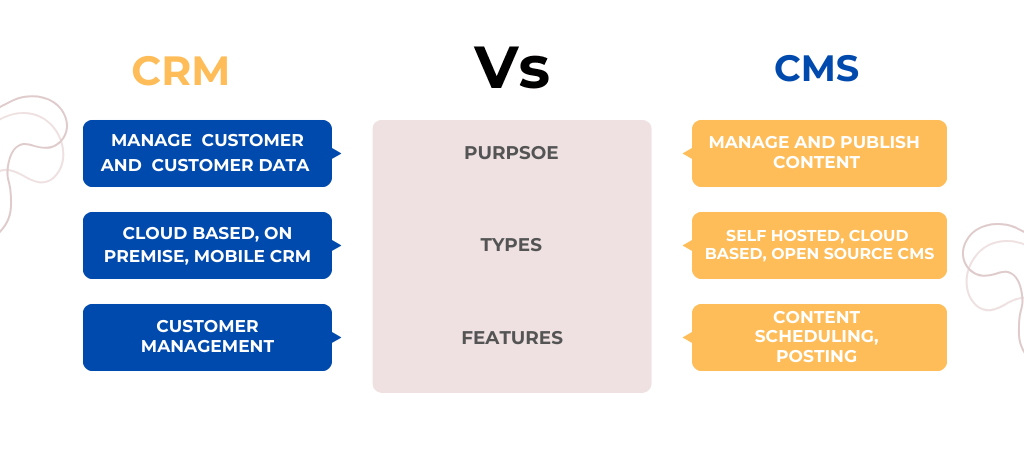
Example Case Study
Imagine a prominent digital marketing agency, switched from a standalone CMS to a CRM platform. By integrating customer data with content management, the agency gained deep insights into customer preferences that enabled them to deliver personalized content to each customer segment, resulting in increased engagement rates, higher conversion rates, and improved customer loyalty.
Have a look at this study for a further, in-depth comparison.
CRM vs. eCRM
How does CRM outshine eCRM in achieving seamless omnichannel experiences?
eCRM or Electronic Customer Relationship Management System focuses on managing customer interactions across digital channels, including email, social media, and websites. However, CRM takes eCRM a step further by offering a holistic approach to customer relationship management across multiple touchpoints. By consolidating customer data from various channels, CRM enables businesses to deliver seamless omnichannel experiences, ensuring consistent messaging, personalized interactions, and smooth transitions between online and offline channels.
Example Case Study
Consider a case study where a leading fashion brand has recognized the limitations of its eCRM system in providing a unified customer experience. By implementing a CRM system, the brand seamlessly integrated customer data from its online stores, social media platforms, and physical stores. This allowed them to deliver personalized recommendations, tailored promotions, and consistent brand messaging across all touchpoints. As a result, the brand witnessed a significant increase in customer satisfaction and brand loyalty.
Refer to this comprehensive comparison analysis for a deeper understanding.
CRM vs. SCM
How does CRM excel in optimizing supply chain collaboration compared to SCM?
CRM and SCM are both enterprise software applications that can help businesses improve their efficiency and profitability, but they serve different purposes. CRM systems are designed to help businesses manage their interactions with customers, while SCM systems are designed to manage the flow of goods and services from suppliers to customers.
To explain in detail, Supply Chain Management or SCM systems are vital for managing the movement of goods and optimizing supply chain processes. However, CRM systems go beyond supply chain optimization by fostering collaboration and transparency among all stakeholders, including customers, suppliers, and partners. CRM provides real-time visibility into inventory levels, order status, and customer demands, enabling efficient coordination and ensuring timely delivery. This collaborative approach sets CRM apart from SCM systems.
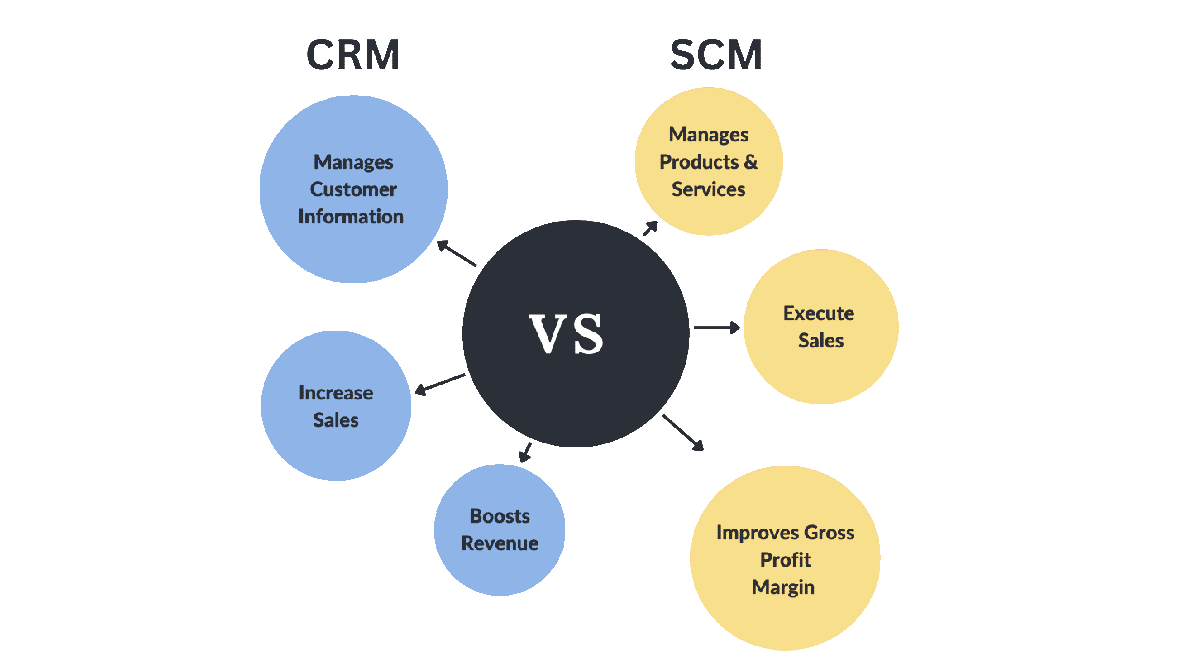
Example Case Study
Consider a logistics and transportation company, which has transitioned from a Supply Chain Management (SCM) system to a CRM platform. By integrating detailed customer data with the supply chain information, the business will now gain valuable insights into customer demands and preferences. They will henceforth improve their business collaboration with suppliers and optimize delivery routes, resulting in reduced costs, faster order fulfillment, and enhanced customer satisfaction.
Check out this detailed study on CRM vs. SCM for a more detailed grasp of the topic.
What’s the final decision?
CRM solutions stand out as the best option in today's complex business and economic environment for fostering and cultivating strong customer connections. CRM adopts a holistic strategy that covers multiple areas of customer-centricity, supplier relationships, content-driven engagement, omnichannel experiences, and supply chain cooperation while alternatives like ERP, SRM, CMS, and SCM target specialized, specific company activities. Businesses may access a variety of advantages that will offer them a competitive edge in the market by using a CRM system.
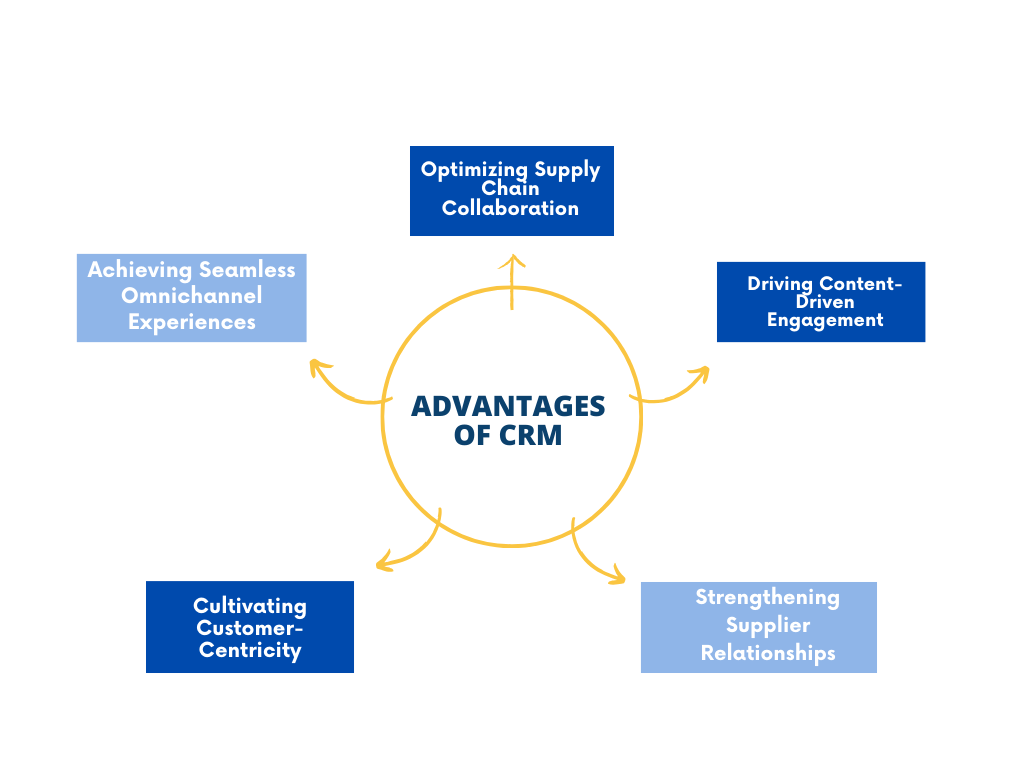
Cultivating Customer-Centricity:
CRM systems are made to give customer interactions, sales, and marketing activities the highest priority. CRM prioritizes consumers above internal processes, in contrast to ERP systems. It provides a comprehensive perspective of clients, allowing businesses to provide individualized experiences, handle issues, and forge long-lasting connections. Take Company X, a renowned online store, as an example. Company X was able to monitor client preferences, purchase history, and interaction patterns by putting in place a CRM system. They were able to deliver excellent customer service, customize marketing messaging, and propose products accordingly. Company X saw a considerable rise in customer satisfaction, repeat business, and total revenue as a result. Thus, with CRM, businesses may comprehend client preferences, foresee their wants, and adjust their products.
Strengthening Supplier Relationships:
CRM systems go above and beyond by including supplier relationship management features, even if SRM systems are excellent at managing supplier connections. Businesses may use CRM to track supplier performance, negotiate contracts, simplify communication, and ensure quick issue resolution. As an illustration, Company X, a manufacturer, improved supplier collaboration by implementing a CRM system. Company X was able to assess supplier performance, negotiate better terms, and address concerns proactively by centralizing supplier data and communication within the CRM system. As a consequence, the connections with suppliers were strengthened, supply chain interruptions were decreased, and overall operational efficiency was increased.
Driving Content-Driven Engagement:
While CRM systems strategically use content to improve client interaction, CMS platforms concentrate on the generation and management of content. Businesses may provide personalized content, targeted marketing campaigns, and customized customer experiences thanks to CRM's integration of customer data with content management capabilities. For instance, Company X, a digital marketing firm, used CRM to improve interaction with content. Company X was able to provide highly targeted content, tailored email campaigns, and unique landing pages by using the CRM system to analyze consumer preferences, browsing behavior, and demographics. Higher engagement rates, more conversions, and greater customer happiness were the results of this strategy, thanks to CRM's integration of customer data with content management capabilities.
Achieving Seamless Omnichannel Experiences:
CRM offers a comprehensive strategy that includes all touchpoints, both online and offline, in contrast to eCRM solutions, which focus on managing customer interactions through digital platforms. Businesses can provide seamless omnichannel experiences because of CRM, which merges customer data from numerous channels. Think about Company X, a retailer that has both physical locations and an online store. Company X was able to combine consumer data from in-person transactions, internet orders, and social media interactions by putting in place a CRM system. They were able to offer unified experiences across all platforms, personalized suggestions, and consistent messaging as a result. Because of this, Company X saw improvements in brand recognition, average order values, and customer loyalty.
Optimizing Supply Chain Collaboration:
CRM systems promote cooperation and transparency among all stakeholders, including consumers, suppliers, and partners, whereas SCM systems optimize the flow of products and services. Real-time visibility into inventory levels, order progress, and customers’ needs is made possible via CRM. Businesses may streamline their supply chain operations, cut costs, and guarantee prompt delivery of goods and services by fostering better collaboration and communication among all parties engaged in the supply chain. To improve supply chain collaboration, firm X, a logistics firm, switched from its old SCM system to a CRM system. Company X was able to optimize inventory levels, enhance delivery and routing, and guarantee on-time order fulfillment by combining customer data with supply chain information.
What is the future of business and CRM Systems?
CRM systems will surely develop and include sophisticated analytics, artificial intelligence, machine learning, and automation as technology continues to grow to further improve customer interactions. CRM systems, for instance, may use predictive analytics to foresee consumer demands and provide tailored recommendations in real time. Data input and lead qualifying are two monotonous chores that can be automated by artificial intelligence, freeing up sales teams' valuable time to concentrate on developing connections. Numerous client data sets may be analyzed by machine learning algorithms to find trends and insights that support customized marketing initiatives.
The future of CRM, according to experts, will focus on using big data, predictive analytics, and hyper-personalization to produce seamless, immersive customer experiences. CRM systems may collect real-time data from numerous linked devices thanks to the development of technologies like the Internet of Things (IoT), which enables businesses to offer customized experiences depending on customer preferences and behavior. Consider a situation in which a smart home device detects a low supply of a certain product and instantly initiates a replenishment order through the CRM system, delivering a smooth customer experience and minimizing disturbances.
Additionally, businesses will be able to interact with clients in their chosen channels and offer prompt help thanks to the integration of CRM with social media platforms, chatbots, and voice assistants. Customers will be able to obtain tailored suggestions, quick answers to questions, and frictionless interactions across many touchpoints. By fostering stronger relationships with consumers, this degree of hyper-personalization will boost advocacy, loyalty, and eventually sustainable development.
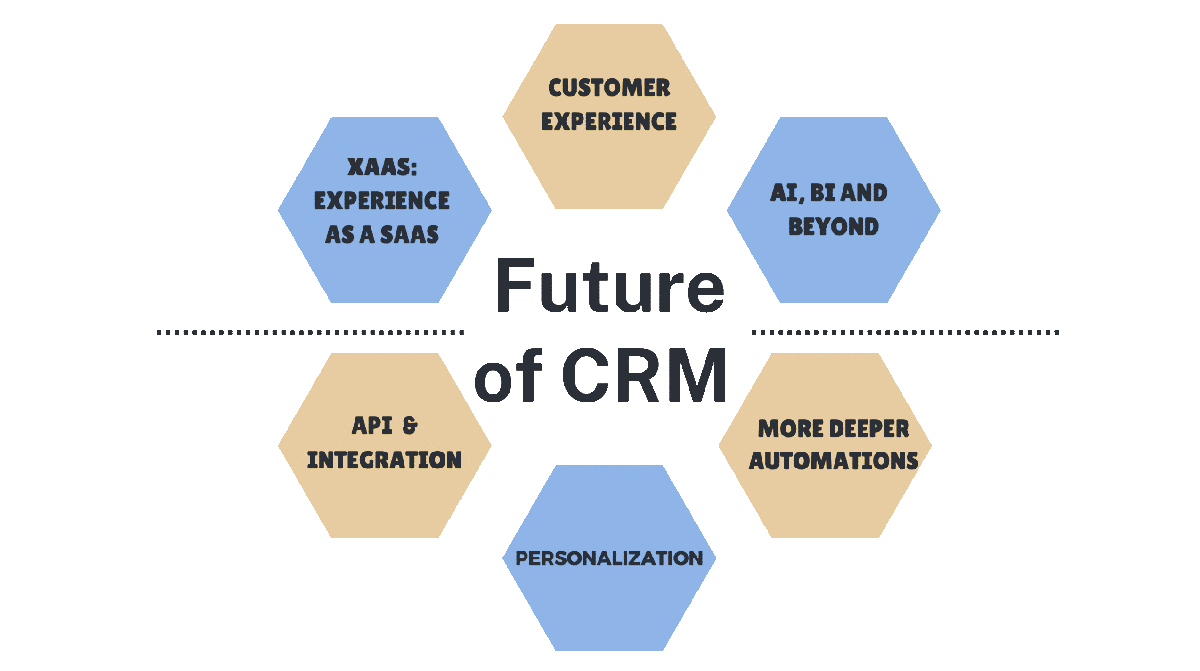
Conclusion
To infer, organizations must invest in strong CRM systems to stand out, forge lasting relationships, and experience sustainable development in a world where consumers have the power. CRM systems provide unmatched capabilities for managing supplier relationships, sales, and customer interactions. They offer the resources and knowledge required to produce personalized experiences, raise client happiness, and encourage steadfast loyalty.
So, don't settle for less when you can improve your company and realize its full potential by utilizing the power of CRM! Take advantage of CRM, develop enduring relationships with your clients, and set off on a path to success. Those who prioritize and invest in customer relationship management will be successful in the future. Start your CRM journey right away with SalesTown CRM to see how it can completely revolutionize your company. Don't hesitate – schedule your personalized demo and kickstart your free trial today to experience the future of sales management firsthand. Your success awaits!
